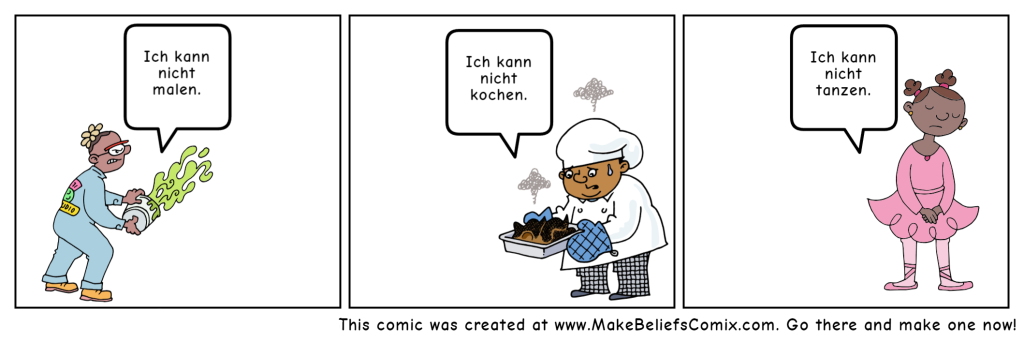4.11 Was ich kann – Talente

Hallo allerseits!
Zum Aufwärmen machen wir unseren Tagesminiplausch und eine Wiederholung.
Wiederholung
In the previous lesson, you learned how to talk about more hobbies and other free time activities. Let’s review.
Besuchst du deine Eltern? Gehst du in die Kirche? Do you visit your parents? Do you go to church? What hobbies or activities are you into at the moment? Use your written journal to recall some hobbies or activities that are meaningful to you.
Lektionsüberblick
Being able to talk about your hobbies and interests may often include the interconnected topic of talents, i.e. the things you are able to do. This lesson will focus on saying what you can (and cannot do). In the end, you will be able to 1) say what you can do and 2) say what you cannot do. You will also be able to 3) say how much German you can now speak.
1) Ich kann…
The word kann in German shares a resemblance to its English counterpart. With that in mind, see if you can figure out the meaning of these sentences.
Let’s practice!
Jetzt bist du dran!
2) Ich kann nicht…
Sometimes we can and sometimes we can’t. What can these characters not do?

Let’s practice.
Jetzt bist du dran!
3) Ich kann etwas Deutsch.
It’s official! You can now say in earnest (im Ernst) one of the following sentences to express your German skill level.
| Ich kann ein bisschen/etwas Deutsch (sprechen). | |
| Ich kann immer besser Deutsch. | |
| Ich kann noch nicht viel Deutsch, aber ich lerne! |
Jetzt bist du dran!
Salzburg im Blickpunkt

Heute gibt es das dritte und letzte Teil zur Geschichte der Stadt Oberndorf. (siehe auch Lektion 4.7 und Lektion 4.10)
Ende des 19. Jahrhunderts erleidete Oberndorf mehrere, immere schwerwiegendere Hochwasserüberschwemmungen (1896, 1897, 1899). Das Hochwasser von 1899 beschädigte oder zerstörte fast alle Gebäude in Oberndorf – auch die spätbarocke Sankt-Nikola-Kirche, wo Stille Nacht, heilige Nacht 83 Jahre vorher aufgeführt wurde. Man beschloss, den gesamten Ort mehrere hundert Meter flussaufwärts zu verlegen und viele Wohnhäuser im alten Gebiet wurden aufgegeben. Auch eine neue Pfarrkirche wurde an der neuen Stelle gebaut. Auf dem Schutt der alten Sankt-Nikola-Kirche, wurde die Stille-Nacht-Gedächtniskapelle zwischen 1924-1937 gebaut. Es gibt eine Nachbildung im Maßstab 1:1 in Frankenmuth im US-Bundesstaat Michigan.

This is the third and last part on the history of the city of Oberndorf. (see also Lektion 4.7 und Lektion 4.10)
At the end of the 19th century, Oberndorf suffered several, increasingly severe floods (1896, 1897, 1899). The 1899 flood damaged or destroyed most of the buildings in Oberndorf, including the Saint Nicola Church, where Silent Night was first performed 83 years earlier. The entire village was moved several hundred meters upriver and most of the residential buildings were abandoned. A new parish church was built in the new town location. Between 1924-1937, the Silent Night Chapel was built on top of the remaining debris of the church. There is a 1:1 scale recreation of the chapel in Frankenmuth, Michigan.
Zum Schluß

*As you conclude this lesson, don’t forget to check Canvas!*

Media Attributions
- Stille-Nacht-Kapelle text adapted from Wikipedia, licensed under a CC BY-SA 4.0 International License.
Media Attributions
- Private: 1010-at-banner-large
- 4.11 ich kann nicht make-beliefs-comix-12-1-2048×684

